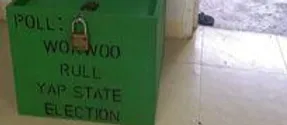The Yap Election Commission in the Federated States of Mironesia (FSM) on Friday will begin tabulating the ballots cast during the 31 May referendum related to the island state’s political status.
Yap voters were asked to answer the question: “Shall the State of Yap commence a review of its political status?”
Officials said the ballot boxes from off-island have arrived at Yap State Election Office.
While waiting for the vote results, Yap Lieutenant Governor Francis Itimai said he did not want to speculate on the Yapese voters’ decision.
“The people went out for the public education. I hope the public educators did a good job in educating them on this referendum It’s a simple yes or no,” Itimai said.
“If they say yes, that means we have to look into amending our constitution.
And then there will be another election on that one. But if they say no, then we stay status quo. That we leave to the people,” he added.
Yap is one of the four states of the Federated States of Micronesia. It has a population of 11,577 and a total land area of 39 square miles.
“We have to be clear that the referendum is not on whether they will secede or not but what will be their political aspiration into the future,” FSM President Wesley Simina said in an interview with the Pacific island Times in April.
“It’s not for the purpose of deciding whether to (call for) a secession or independence.”
Just the same, Wesley cautioned that any movement toward secession could have an impact on the FSM’s Compact of Free Association with the United States.
Under COFA, the U.S has exclusive defence rights in the FSM. The Pentagon eyes Yap as a potential divert field and a military exercise site.
Yap is receiving huge investments from the U.S government. The US$400 million airport runway expansion is thus far the largest Washington-funded project in Yap.
The political status vote was originally scheduled for 31 January but Yap Governor Charles S. Chieng issued a directive amending the date to 31 May to resolve the logistical obstacles and provide adequate time to educate Yap residents on what the referendum entailed.
The referendum task force last year reported encountering challenges, including the unavailability of the state vessel for outreach to neighbouring islands and international travel resources, hampering logistical plans.
In his executive order, Chieng stressed the importance of providing the task force with adequate time and resources “to effectively carry out public education initiatives.














